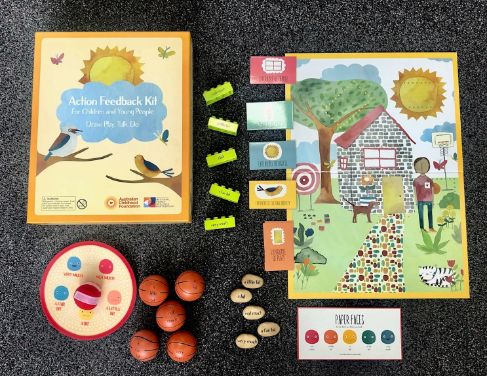Below are a variety of resources that are available for downloading. You will require Acrobat PDF viewer to view these documents.
Click Here to download Acrobat if required.
VACCA, with the support of Family Safety Victoria, has produced a video called ‘Yarn Safe’. This video was developed for sector partners who support and work alongside Aboriginal and Torres Strait Islander community members experiencing and impacted by family violence.
Since the introduction of the Information Sharing Scheme and Multi-Agency Risk Assessment and Management framework (MARAM), the need for culturally safe language has become more evident. Aboriginal Community Controlled Organisations (ACCOs) like VACCA are regularly asked to provide guidance on sensitive and safe engagement with community members.
We know that the use of mainstream language can trigger and retraumatise community members, creating a barrier to reporting family violence, and accessing and engaging with culturally safe services. The video demonstrates instances of culturally unsafe language and provides information and guidance to support the use of language that is is culturally safe and inclusive.
These short courses explain a few key intersecting systems practitioners are likely to encounter when responding to family violence. They can be approached in any order and are designed to be easy to jump in and out of as needed. They can provide a full legal induction or be used simply to look for answers on specific topics. Each course is made up of videos, links to further resources, factsheets and more which build on the material. They are supposed to act as a bit of a training manual – with real, practical guidance on how to help and what not to do.
The Statewide Children’s Resource Program is funded by the Department of Families, Fairness and Housing to assist, support, and resource homelessness and other non government services to respond more effectively to the needs of children who have experienced homelessness and/or family violence.
The Statewide Children’s Resource Program has developed a range of resources to support practitioners to better respond to the needs of children.
Developed to assist workers across Inner- and Outer- Eastern Melbourne to navigate the various health and community support sectors, for the benefit of the people (consumers and carers/families) that they work with.
The guide will also assist providers to understand key entry points to the various service sectors.
The resource is divided into sector specific sections and contains information to assist staff to know the eligibility criteria, catchments, and suitable entry points. This information aims to support appropriate referrals for people. It also includes some useful links and demystifies acronyms and terms for each sector. This guide does not intend to provide a comprehensive list of services and supports, but rather key access points that will assist with service navigation.
This presentation discusses the cultural factors that influence family and social dynamics among older and younger men and women within the Chinese community. Specifically, Dr. Satyen will inform health service providers and practitioners of the differences in the perception of gender roles within the community. The important role that health services could play in implementing strategies to improve the gender parity among members of the Chinese community will be discussed.
Victoria State Government has released Victoria’s Social Recovery Framework Covid-19 recovery.
Victoria State Government Family Violence Jobs Hub
What if your new job was helping people affected by family violence? The family violence sector needs people like you. We need people with different skills, experiences and backgrounds for roles as diverse as the communities we serve.
Mental Health and Alcohol and Other Drugs Navigation Tools
EMHSCA have made some significant updates to the EMHSCA AOD access charts and the MH Navigation pictorials. Click below for the updated navigation tools which can also be located here https://www.emphn.org.au/what-we-do/mental-health/eastern-mental-health-service-coordination-alliance-emhsca under ‘Navigating Services’ on the landing page.
The WIFVC has launched a new resource Building Familiarity of the Information Sharing Schemes – Cross-Sectoral Family Violence Information Sharing Activity. This resource will support prescribed workforces to consider how the Family Violence Information Sharing Scheme and Child Information Sharing Scheme work in practice.
Family Access Network has created this referral matrix of local, state and national services for LGBTIQ+ children, teens, adults and families.
Family Access Network has created this local resource and referral guide featuring local, state and national health, counselling and support services for LGBTIQ+ children, teens, adults and families.
This brochure was produced by the RFVP in consultation with the Women with Disabilities Family Violence Working Group.
It provides information to recognise and respond to violence used against people with disabilities.
This resource is currently undergoing redevelopment. Come back soon to access the updated resource.
Children’s experience of services is critical to understand to ensure services meet the needs of children and young people. Children can provide valuable insights into how services should be configured, implemented and reviewed. They also have inherent rights to participate in decision making that affects their lives. The RFVP and ACF worked together to develop a framework for family violence oriented services that will engage children sensitively in order for them to provide feedback about their experiences of services.
ACF and RFVP will be hosting free training sessions for workers in the Eastern Metropolitan Region. The training sessions offer participants the opportunity to:

Australian Childhood Foundation and Eastern Metropolitan Region Family Violence Partnership trauma-informed practice guide for responding to children and young people affected by family violence.
Upcoming Safe and Secure Training will be advertised via the RFVP calendar and newsletter. Click here to view the RFVP calendar.
Case studies can be used at forums, trainings and events to understand the practical application of legislation such as the Information Sharing Schemes and to improve integrated practice between specialist family violence services and related services.